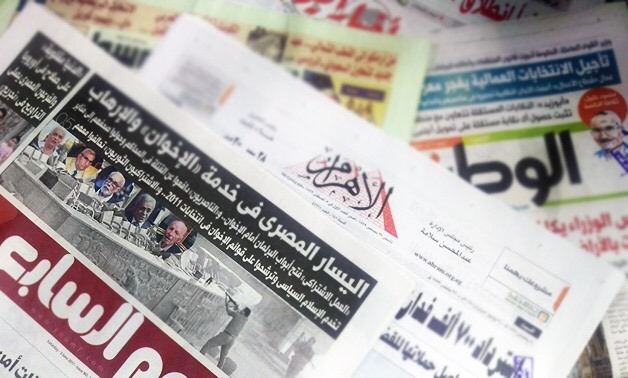
Egyptian newspapers - File photo
CAIRO - 5 June 2017: Arab columnists tackled many topics on Sunday, covering strained Sudanese-Egyptian relations, Kuwait’s mediation between Qatar and other Gulf states, Ramadan TV drama, the Naksa [Setback] anniversary and U.S. intention to move its embassy in Israel to Jerusalem.
Al-Ahram
Poet Farouk Gowaida writes "Exporting Misery to TV Screens", citing three reasons for prevailing feelings of pain and sorrow across Egypt’s streets since the beginning of the holy month of Ramadan. First: The screened TV drama series are poor in scenario, content and performance, despite their LE 2 billion plus price tags. Second: TV advertisements breed sorrow. Almost half of the running ads are about endless diseases and the suffering of the poor. Third: The ads marketing villas, palaces and fancy products are frustrating to millions of middle-class citizens struggling to cope with the hardships of everyday life.
Gowaida wishes there were only a few works worth watching among the 40 dramas on air and stresses the need for products that uphold social values, rather than ruin them.
Al-Akhbar
Galal Dowaidar writes, "Tamim in Kuwait, dreading grim destiny." The writer tackles Qatar’s strategy of slamming and plotting against Arab countries such as Saudi Arabia, the United Arab Emirates and Egypt under incumbent Prince Tamim bin Hamad Al Khalifa.
Dowaidar cites Tamim’s support and funding of terrorist groups in the region as in Syria, Libya, Iraq and Yemen and attempting to interfere in Egypt’s domestic affairs. He sees Qatar's endeavors to mend fences as a sign of regret and notes that Doha is dreading grim prospects if it were to decide to get involved in a confrontation with Arab and other Gulf countries.
On his part, Galal Aref recalls two contradictory feelings in his essay "Between defeat culture & victory certainty." Aref writes about the October War victory in 1973 coinciding with 10 Ramadan when the Zionist entity was defeated at the hands of the Egyptian army, on one hand, and the "Naksa [setback] anniversary" on 5 June. Seeing “our homeland created to vanquish enemies, not to be broken or corrupted” Aref adds, "History corrects conquests that seek to fabricate or change facts."
Aref affirms that Egypt’s enemies want it to only remember the painful feelings of Naksa. However, Egyptians must insist on refusing defeat and continue the struggle until new victory.
Al-Shorouk
Famhi Howaidi writes "The White House Revisions" on putting off President Trump’s decision to move the U.S. Embassy from Tel Aviv to Jerusalem. Howaidi welcomes the postponement of Trump’s decision as neither final nor wise as it would not prove any good intention towards the Palestinian side.
Noting Trump's warm feelings towards the Israelis, as manifest in his visit to Jerusalem in May, Howaidi sees the White House hosting two parties with two different views at the moment. While the first party reflects traditional American foreign policy, represented by U.S. institutions, the second is represented by the newcomers to the White House who have their own ideologies and claim to be defending popular interests.
Youm7
Dandarawy Hawary writes under the title, "Secret of the Sudanese anger at rumors about Egyptian military bases in Eritrea and Juba." Hawary defends the Egyptian-Sudanese relationship, urging both countries to uphold good ties and not give foreign forces a chance to exploit the current disputes.
He cites the benefits of cooperation between the two nations that share common views on many regional and international issues. Referring to news in Sudanese media claiming that Egyptian military bases are in Eritrea and Juba, Hawary says if Egypt had military bases in the above mentioned countries that would not have harmed Sudan’s national security because they would definitely aim at facing Israeli spread in the Nile basin.

Comments
Leave a Comment